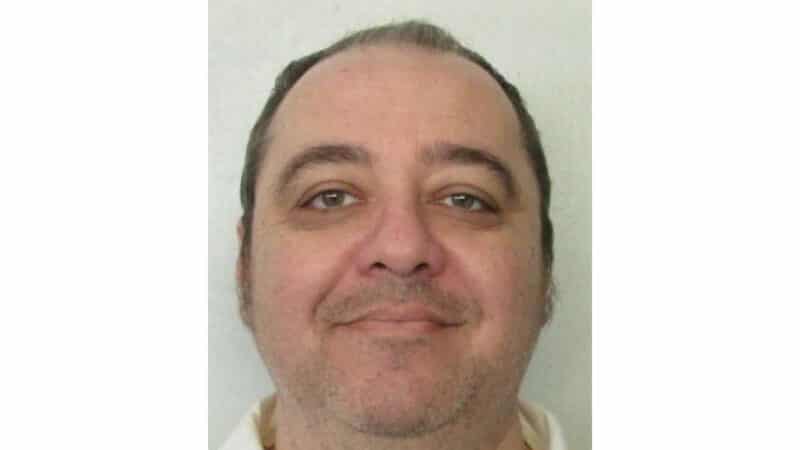Alabama’s plan for execution by nitrogen gas is ‘hostile to religion,’ lawsuit says
MONTGOMERY, Ala. (AP) — Lawyers for a spiritual adviser to an Alabama inmate scheduled to be executed with nitrogen gas next month said in a complaint filed Wednesday that restrictions on how close the adviser can get to the inmate in the death chamber are “hostile to religion.”
The Rev. Jeff Hood, who plans to enter the death chamber to minister to Kenneth Eugene Smith, said the Alabama Department of Corrections asked him to sign a form acknowledging the risks and agreeing to stay 3 feet (0.9 meters) away from Smith’s gas mask. Hood, a death penalty opponent, said that shows there is a risk to witnesses attending the execution. He said the restrictions would also interfere with his ability to minister to Smith before he is put to death.
“They’ve asked me to sign a waiver, which to me speaks to the fact that they’re already concerned that things could go wrong,” Hood said in a telephone interview.
Smith’s execution would be the nation’s first using nitrogen gas. The nitrogen is planned be administered through the gas mask placed over Smith’s nose and mouth while he is strapped to a gurney in the death chamber normally used for lethal injections.
Hood’s lawyers also argued in their complaint that Alabama’s restrictions on how close he can get to Smith will “deny a prisoner his chosen spiritual advisor’s touch at the most critical juncture of his life: his death.”
Hood said he anointed Alabama inmate Casey McWhorter as he was strapped to the gurney before his execution last month. He said he planned to do the same with Smith. The U.S. Supreme Court ruled last year that states must accommodate the wishes of death row inmates who want to have their pastors pray aloud and even touch them during their executions.
An Alabama Department of Corrections spokesperson declined to comment on the form, citing ongoing litigation.
Nitrogen makes up approximately 78% of the air inhaled by humans and is harmless when inhaled with proper levels of oxygen. Under the proposed execution method, pure nitrogen would replace the inmate’s breathing air, depriving the inmate of oxygen needed to maintain bodily functions and killing them. While proponents of the new method have theorized it would be painless, opponents have likened it to human experimentation.
The form, which Hood signed in order to attend Smith’s execution, gave an overview on the risk of nitrogen gas. It stated that in the “highly unlikely event that the hose supplying breathing gas to the mask were to detach, an area of free-flowing nitrogen gas could result, creating a small area of risk (approximately two feet) from the outflow.”
It also warned overpressure could result in a small area of nitrogen displacing oxygen in the area around the inmate’s face or head.
Smith was one of two men convicted in the 1988 murder-for-hire slaying of Elizabeth Sennett in northwestern Alabama. The state Department of Corrections tried to execute Smith by lethal injection last year but called it off when the execution team could not get the required two intravenous lines connected to Smith.
Hood said Smith’s first attempted execution was “horribly botched” and that “now they’ve got him in line to be experimented on again.”
Three states — Alabama, Oklahoma and Mississippi — have authorized nitrogen hypoxia as an alternative execution method.
FCC calls for more ‘patriotic, pro-America’ programming in runup to 250th anniversary
The "Pledge America Campaign" urges broadcasters to focus on programming that highlights "the historic accomplishments of this great nation from our founding through the Trump Administration today."
NASA’s Artemis II lunar mission may not launch in March after all
NASA says an "interrupted flow" of helium to the rocket system could require a rollback to the Vehicle Assembly Building. If it happens, NASA says the launch to the moon would be delayed until April.
Mississippi health system shuts down clinics statewide after ransomware attack
The attack was launched on Thursday and prompted hospital officials to close all of its 35 clinics across the state.
Blizzard conditions and high winds forecast for NYC, East coast
The winter storm is expected to bring blizzard conditions and possibly up to 2 feet of snow in New York City.
Norway’s Johannes Klæbo is new Winter Olympics king
Johannes Klaebo won all six cross-country skiing events at this year's Winter Olympics, the surpassing Eric Heiden's five golds in 1980.
Willie Colón, salsa pioneer, has died at 75
The South Bronx bandleader took the Latin genre to new heights while recording for Fania Records.






